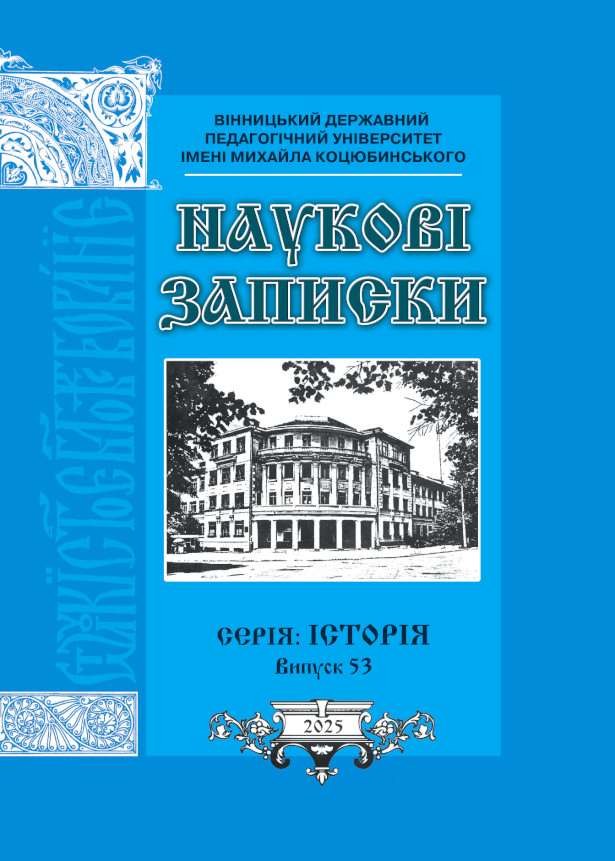Abstract
This article aims to analyze the development of Polish-Japanese relations, which emerged during the years 1904–1905 on the basis of a shared anti-Russian agenda. Particular attention is devoted to the evolution of these relations in the interwar period, especially in the context of Poland’s Promethean strategy. This geopolitical concept sought the disintegration of the Soviet Union and the annexation of parts of its territory under the guise of establishing quasi-independent national republics. The methodological framework of the study is grounded in the principles of historicism and scholarly objectivity. Among the general scientific methods applied, the logical method made it possible to explore the spatial dynamics of Polish-Japanese relations, while the historical method enabled an examination of their evolution over time. The scholarly novelty of this research lies in its use of these methods to uncover the historical context in which Polish-Japanese relations emerged during the period of Poland’s statelessness. The analysis of Józef Piłsudski’s policies in fostering cooperation with Japan demonstrates a convergence of interests between the two nations in the dismemberment of Tsarist Russia and, later, the Soviet Union into separate national states. It is established that Polish-Japanese cooperation was characterized by a distinctly anti-Russian, anti-Soviet, and anti-communist orientation. Conclusions. The origins of Polish-Japanese cooperation can be traced back to the Russo-Japanese War of 1904–1905, where their shared opposition to the Russian Empire provided a common strategic foundation. In the interwar period, this antagonism persisted, though within a significantly altered geopolitical landscape: in 1918, an independent Polish state was restored, and in 1922, the Bolsheviks consolidated most of the former territories of the Russian Empire into the Soviet Union. Throughout the 1930s, Polish-Japanese relations evolved within the framework of Poland’s Promethean strategy, which sought the fragmentation of the Soviet Union into separate national states. Japan’s interests, shaped by its Pan-Asian doctrine, aligned with Poland’s objectives – particularly with regard to the idea of establishing a puppet Ukrainian state, known as Zeleny Klyn (Green Ukraine), in the Russian Far East. Although these plans proved unrealistic and unattainable during the 1930s, bilateral cooperation between Poland and Japan continued to develop in a sustained and mutually beneficial manner.
References
Bączkowski, W. (1938). Konflikt japońsko-rosyjski. [The Japanese-Russian Conflict.]. Myśl Polska – Polish Thought. R. III. Nr 16 (62).
Bączkowski, W. (2009). Luźne uwagi o pracy prometejskiej na Dalekim Wschodzie. [Loose remarks on Promethean work in the Far East]. Zeszyty Historyczne – Historical Notebooks. Paryż. Z. 169. S. 134-135.
BPP, AAK – Biblioteka Polska w Paryżu, Akta Aleksandra Kawałkowskiego. [BPP, AAK - Polish Library in Paris, Files of Aleksander Kawałkowski].
CAW – Centralne Archiwum Wojskowy, Oddziаł II Sztabu Głównego. [CAW – Central Military Archives, Department II of the General Staff.
Charaszkiewicz, E. (1974). Przebudowa Wschodu Europy. Fragmenty faktów y lat 1917-1921. [Reconstruction of Eastern Europe. Fragments of facts from 1917-1921]. Niepodległość – Independence. Tom IX. Londyn. S. 229-285. [in Polish].
Charszkiewicz, E. (1955). Przebudowa Wschodu Europy. Materiały do polityki wschodniej Józefa Piłsudskiego w latach 1893-1921. [Reconstruction of Eastern Europe. Materials for Józef Piłsudski's Eastern Policy in the Years 1893-1921]. Niepodległość – Independence. T. 5. S. 125-167.
Kossenko, I. (1974). L'Ukraine d'Extrême Orient. [L'Ukraine d'Extrême Orient.]. Prométhée – Prometheus. Vol. 97. Рp. 4-8.
Kożuchowski, A. (1937). Japonia na kontynencie! [Japan on the continent!]. Myśl Polska – Think Poland. R. II. Nr 15(37).
Kuromiya, H., & Libera P. (2009). Notatki Włodzimierza Bączkowskiego na temat współpracy polsko-japońskiej wobec ruchu prometejskiego (1938). [Notes by Włodzimierz Bączkowski on Polish-Japanese cooperation towards the Promethean movement (1938).]. Zeszyty Historyczne – Historical Notebooks. Z.169.
Kuromiya, H., Libera P. & Pepłoński A. (2009). O współpracy polsko-japońskiej wobec ruchu prometejskiego raz jeszcze. [On Polish-Japanese cooperation in the context of the Promethean movement once again.]. Zeszyty Historyczne – Historical Notebooks. Z. 170.
Kuromiya, H., & Pepłoński A. (2009). Między Warszawą a Tokio. Polsko-japońska współpraca wywiadowcza 1904-1944. [Between Warsaw and Tokyo. Polish-Japanese Intelligence Cooperation 1904-1944.]. Toruń. 529 s.
Okipniuk, V., & Kozlov D. (2023). Spivrobitnytstvo spetssluzhb derzhavnoho tsentru Ukrainskoi Narodnoi Respubliky v ekzyli ta Yaponii v pershii polovyni 1930-kh rokiv. [Cooperation between the special services of the state center of the Ukrainian People's Republic in exile and Japan in the first half of the 1930s.]. Ukrainian Historical Journal. № 1 (568). S. 103-120. https://doi.org/10.15407/uhj2023.01.103
Orlowski, W. (1937). Za przykładem Japonii. [Following the example of Japan.]. Myśl Polska – Think Poland. R. II. Nr 22(44).
Pałasz-Rutkowska E., & Romer A.-T. (1996). Historia stosunków polsko-japońskich: 1904-1945. [History of Polish-Japanese relations: 1904-1945.]. Warzawa. Bellona. 1996. 284 s. https://dokumen.pub/historia-stosunkow-polsko-japonskich-1904-1945-8311085978.html
Piłsudski, J. (1937). Pisma zbiorowe. [Collective writings.]. Warszawa. T. II.
RHVA – Rossyiskyi hosudarstvennыi voennыi arkhyv. [RGVA – Russian State Military Archive].
Referat red. V. Bonchkovskoho v Lutsku. (1937). [Abstract of the editor V. Bonchkovsky in Lutsk.]. Volynske slovo – Volynske slovo. 21.11.
Svit, I. (1962). Klub «Prometei» v Kharbini. [The Prometheus Club in Harbin]. Ukrainski visti – Ukrainian News. Ch. 20.
Svіt, I. (1972). Ukrainsko-iaponskі vzaiemyny 1903-1945. Istorychnyi ohliad і sposterezhennia. [Ukrainian-Japanese Relations. 1903-1945. Historical Review and Observations.]. New York, 371 s.
Zbiór dokumentów ppłk. Edmunda Charaszkiewicza. [Collection of documents of Lieutenant Colonel Edmund Charaszkiewicz]. (2000). Opracowanie, wstęp i przypisy A.Grzywacz, M. Kwiecień, G. Mazur. Kraków.

This work is licensed under a Creative Commons Attribution 4.0 International License.
Copyright (c) 2025 Stepan Borchuk, Volodymyr Komar, Adam Szymanowicz





